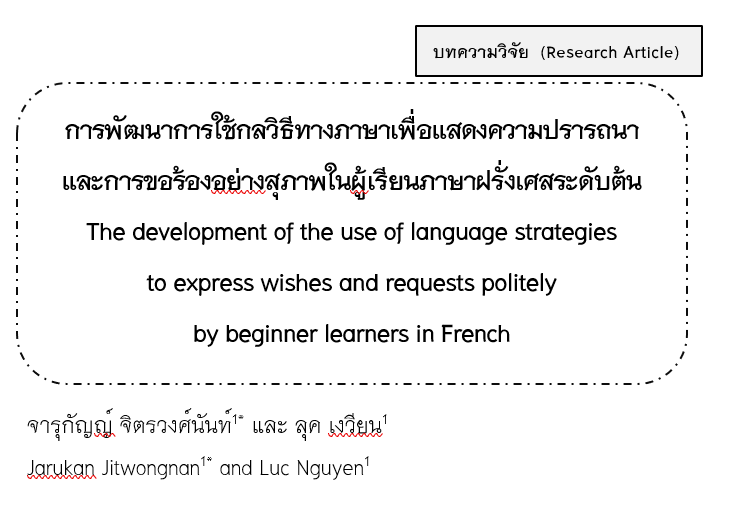The Development of the Use of Language Strategies to Express Wishes and Requests Politely by Beginner Learners in French
Keywords:
Request, Politeness, French, Context of communicationAbstract
This study was conducted with the idea that an introduction of simple expressions concerning the wishes and requests as well as the polite forms allows beginners’ learners to express the wishes and requests by respecting the context of communication. Based on experimental research, the purposes of this study were 1) to develop a learning unit entitled “Expressing the wishes and requests politely” 2) to compare pretest and posttest scores before and after a teaching intervention by using the developed learning unit as mentioned 3) to ascertain the Effectiveness Index (E.I.) of the learning unit. The instruments consisted of the learning unit entitled “Expressing the wishes and requests politely” and a pretest and posttest. The participants of this research were 33 students of the University of Phayao selected from the students who enrolled in French Listening and Speaking 1 Course as an optional subject in the first semester of 2021. The findings showed that learners’ posttest scores were significantly higher than the pretest scores at the 0.05 level of statistical significance. The mean of the different scores between pretest and posttest was at 6.81 (42.21% of the total score) with the confidence index at 97.2% (S.D.=2.74). Regarding to the E.I., the learning unit allowed students to improve the ability to express the wishes and requests with the E.I. at the level of 0.64. That means learners’ achievement of the use of language strategies about the polite requests or wishes was higher with the index at 64%.
References
เกริก ท่วมกลาง & จินตนา ท่วมกลาง. (2555). การพัฒนาสื่อ/นวัตกรรมทางการศึกษาเพื่อเลื่อนวิทยฐานะ. กรุงเทพฯ: สถาพรบุ๊คส์.
ชัยยงค์ พรหมวงศ์. (2556). การทดสอบประสิทธิภาพสื่อหรือชุดการสอน. วารสารศิลปากรศึกษาศาสตร์วิจัย, 5(1), 7-20.
ชูศรี วงศ์รัตนะ. (2564). เทคนิคการใช้สถิติเพื่อการวิจัย (พิมพ์ครั้งที่ 15). กรุงเทพฯ: อมรการพิมพ์.
ทิศนา แขมมณี. (2563). ศาสตร์การสอน (พิมพ์ครั้งที่ 24). กรุงเทพฯ: สำนักพิมพ์จุฬาลงกรณ์มหาวิทยาลัย.
นรินธน์ นนทมาลย์, นริศรา เสือคล้าย, กัลวรา ภูมิลา, สุมิตรา อินทะ, ณัฐพงษ์ พรมวงษ์. (2564). การสำรวจปัญหาการจัดการเรียนการสอนออนไลน์ในหมวดวิชาศึกษาทั่วไปของนิสิตมหาวิทยาลัยพะเยา. วารสารเทคโนโลยีและสื่อสารการศึกษา, 16(20), 61–73.
ปิยจิตร สังข์พานิช. (2560). การพัฒนาทักษะการพูดภาษาฝรั่งเศสด้วยการแสดงบทบาทสมมติ สําหรับนักศึกษา วิชาเอกการจัดการการท่องเที่ยว คณะวิทยาการจัดการ มหาวิทยาลัยราชภัฏจันทรเกษม. วารสารสมาคมครูภาษาฝรั่งเศสแห่งประเทศไทย, 40(134), 41–54.
ปิยจิตร สังข์พานิช. (2564). การพัฒนาทักษะการเขียนภาษาฝรั่งเศสเพื่อการสื่อสารในชีวิตประจำวันแบบ 3P ประกอบแบบฝึกทักษะของนักศึกษาที่ลงทะเบียนเรียนรายวิชาภาษาฝรั่งเศสเพื่อการสื่อสารในชีวิตประจำวัน (GETL1102) หมวดวิชาการศึกษาทั่วไป มหาวิทยาลัยราชภัฏจันทรเกษม. การประชุมวิชาการเครือข่ายความร่วมมือทางวิชาการ-วิจัย สายมนุษยศาสตร์และสังคมศาสตร์ครั้งที่ 14 (145–158).
พิไลพร สุขเจริญ, จุฬาลักษณ์ แก้วสุก, สุนันทา ลักษ์ธธิติกุล, เสาวพฤกษ์ ช่วยยก, ศิมาภรณ์ พวงสุวรรณ และ สุพัตรา ลักษณะจันทร์. (2564). ถอดบทเรียนจากประสบการณ์ของนักศึกษาพยาบาลผ่านการเรียนการสอนออนไลน์ภายใต้วิกฤตการณ์การแพร่ระบาดของโรคโควิด 19. วารสารศูนย์การศึกษาแพทยศาสตร์คลินิก โรงพยาบาลพระปกเกล้า, 38(2), 224–231.
สว่าง วงศ์พัวพันธุ์. (2535). ไวยากรณ์ฝรั่งเศสฉบับดวงกมล. กรุงเทพฯ: ดวงกมล.
สอางค์ มะลิกุล. (2551). ไวยากรณ์ฝรั่งเศส หลักไวยากรณ์และคู่มือการสอบเข้ามหาวิทยาลัยวิชาภาษาฝรั่งเศส (พิมพ์ครั้งที่ 2). กรุงเทพฯ: บริษัทสำนักพิมพ์ข้าวฟ่าง จำกัด.
สิรจิตต์ เดชอมรชัย. (2556). การสอนภาษาฝรั่งเศสในฐานะภาษาต่างประเทศ: แนวคิดและวิธีการ. กรุงเทพฯ: สำนักพิมพ์จุฬาลงกรณ์มหาวิทยาลัย.
สิรจิตต์ เดชอมรชัย. (2560). กิจกรรมการเรียนรู้เชิงรุกสำหรับผู้เรียนภาษาฝรั่งเศสระดับเริ่มต้น. วารสารสมาคมครูภาษาฝรั่งเศสแห่งประเทศไทย, 40(134), 16–27.
สุพรรณี จันทน์คราญ. (2537). ความรู้ด้านวัฒนธรรมและการสอนภาษาฝรั่งเศสเพื่อการท่องเที่ยว. วารสารมนุษยศาสตร์วิชาการ, 2(1), 41–46.
Abouda, L. (2004). Deux types d’imparfait atténuatif. Langue française, 142(2), 58–74.
Alcaraz, M., Braud, C., Calvez, A., & Cornuau, G. (2016). Édito: Méthode de français: niveau A1. Didier.
Anscombre, J.-C. (2004). L’imparfait d’atténuation: Quand parler à l’imparfait, c’est faire. Langue française, 142(1), 75–99. Form https://doi.org/10.3406/lfr.2004.6793.
Bae, J. A., & Park, D.-Y. (2013). L’enseignement de la politesse dans la classe de francais langue étrangère en Corée. Revue japonaise de didactique du français, 8(1), 60–73. Form https://doi.org/10.24495/rjdf.8.1_60.
Bertaux, L., Calvez, A., & Ripaud, D. (2019). Bonjour et bienvenue! Méthode de français A1.1. Didier.
Brown, P., & Levinson, S. C. (1987). Politeness: Some Universals in Language Usage. Cambridge University Press.
Burke, P. (1999). Les langages de la politesse. Terrain. Anthropologie & sciences humaines, 33, 111-126. Form https://doi.org/10.4000/terrain.2704.
Charaudeau, P. (1992). Grammaire du sens et de l’expression. Hachette éducation.
Charaudeau, P. (2014). Étude de la politesse, entre communication et culture. In A.-M. Cozma, A. Bellachhab, & M. Pescheux (Eds.), Du sens à la signification. De la signification aux sens. Mélanges offerts à Olga Galatanu, 137–154. Form http://www.patrick-charaudeau.com/Etude-de-la-politesse-entre.html.
Charaudeau, P. (2019). Grammaire du sens et de l’expression (Fac-similé de l’édition Hachette, Paris, 1992, relue et corrigée). Lambert-Lucas.
Conseil de l’Europe. (2001). Cadre européen commun de référence pour les langues: Apprendre, enseigner, évaluer. Form https://www.coe.int/fr/web/common-european-framework-reference-languages/home.
Goodman, R. I., Fletcher, K. A., & Schneider, E. W. (1980). The Effectiveness Index as a Comparative Measure in Media Product Evaluations. Educational Technology, 20(9), 30–34.
Holttinen, T. (2017). « Passe-moi le sel » vs « Pourriez-vous me passer le sel, s’il vous plaît ? » ‒ Le développement des stratégies de requête chez les apprenants finnophones de FLE. SHS Web of Conferences, 38, 00004. Form https://doi.org/10.1051/shsconf/20173800004.
Ivan, I. (1994). Lev S. Vygotsky. Perspective: Revue trimestrielle d’éducation comparée. Revue trimestrielle d’éducation comparée, 14(3/4), 793–820.
Jaimee-Aree, P. (2018). Analyse des interactions entre enseignant et apprenants en classe. Bulletin de l’ Association thaïlandaise des professeurs de français, 32(118), 46–59.
Kerbrat-Orecchioni, C. (2001). « Je voudrais un p’tit bifteck » La politesse à la française en site commercial. Les Carnets du Cediscor [En ligne], 7, 105–118. http://journals.openedition.org/cediscor/307. https://doi.org/10.4000/cediscor.307.
Kerbrat-Orecchioni, C. (2010). L’impolitesse en interaction. Lexis. Journal in English Lexicology, HS 2. Form https://doi.org/10.4000/lexis.796.
Kerbrat-Orecchioni, C. (2022). Les interactions en site commercial: Des interactions « polies ». In V. Traverso (Ed.), Les interactions en site commercial: Invariants et variations (105–137). ENS Éditions. Form http://books.openedition.org/enseditions/31010.
Lesot, A. (2018). L’essentiel: Pour mieux s’exprimer à l’écrit et à l’oral. Hatier Paris.
Meunier, C. (2017). Grammaire participative: Enseigner avec la contribution active des apprenants. BoD - Books on Demand.
Orféo. (n.d.). Retrieved September 5, 2022, From https://orfeo.ortolang.fr/?locale=fr.
Poisson-Quinton, S., Mimran, R., & Mahéo-Le Coadic, M. (Eds.). (2007). Grammaire expliquée du français: Niveau intermédiaire. CLE International.
Poisson-Quinton, S., Siréjols, E., Mimran, R., & Bruley, C. (2011). Amical: A1. CLE international.
Riegel, M., Pellat, J. C., & Rioul, R. (2009). Grammaire Méthodique du Français (4e ed.). Presses Universitaires de France.
Rossi-Gensane, N., & Ursi, B. (2020). Syntaxe et genre interactionnel: Le cas des interrogatives directes partielles dans les interactions commerciales. Langages, 219(3), 147–160. Form https://doi.org/10.3917/lang.219.0147.

Downloads
Published
How to Cite
Issue
Section
License
Copyright (c) 2023 Phayao University

This work is licensed under a Creative Commons Attribution-NonCommercial-NoDerivatives 4.0 International License.
ผู้นิพนธ์ต้องรับผิดชอบข้อความในบทนิพนธ์ของตน มหาวิทยาลัยพะเยาไม่จำเป็นต้องเห็นด้วยกับบทความที่ตีพิมพ์เสมอไป ผู้สนใจสามารถคัดลอก และนำไปใช้ได้ แต่จะต้องขออนุมัติเจ้าของ และได้รับการอนุมัติเป็นลายลักษณ์อักษรก่อน พร้อมกับมีการอ้างอิงและกล่าวคำขอบคุณให้ถูกต้องด้วย
The authors are themselves responsible for their contents. Signed articles may not always reflect the opinion of University of Phayao. The articles can be reproduced and reprinted, provided that permission is given by the authors and acknowledgement must be given.







